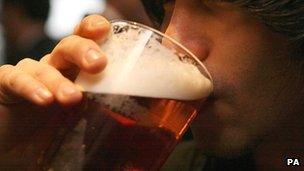Parents helping kids binge drink?
- Published
- comments

Proxy sales of alcohol have become an increasing problem
The potential for children to buy alcohol online dominated press coverage of a report into underage drinking by Plymouth University's Dr Adrian Barton, external this week.
It centres on the ease with which it is possible to avoid giving proof of age when buying booze on the internet.
This apparently contrasts with a steep decline in the number of face-to-face sales where ID checks have become much more rigorous.
The Home Office's response to the report didn't address the new challenges faced by the internet:
"We are already tackling under-age drinking and cracking down on irresponsible and criminal businesses. Buying alcohol for someone under 18 is illegal and the police will prosecute.
"The government have ensured there are stiff penalties in place, with a £5,000 fine for individuals and a new maximum fine for businesses, who persistently offend, of £20,000."
However, Sarah Wollaston, external - MP for Totnes, GP and vociferous campaigner against alcohol abuse - had a couple of suggestions for ministers:
The report concedes there are no figures to show how much of a problem online sales have become.
Proxy sales - adults buying alcohol for children - are another matter.
This, according to the report, is now the under-age drinker's 'preferred route' - and the adult involved is very often the child's parent.
A tricky one, because the strictures of the law rehearsed by the Home Office, external ease up when it comes to parents and their own children.
In practice this seems to facilitate everything from a modest glass of wine at a family meal to packing little Johnny off to a beach party armed with a large bottle of vodka.
The more liberal interpretation of the law in Newquay was raised by local MP Stephen Gilbert, external in the Commons last November.
He asked for the legislation to be tightened so that parents have to supervise the drinking as well as the buying of alcohol.
Dr Wollaston had a couple of ideas on this subject too - but they stop short of changing the law.
How realistic is the culture change she's hoping for, though?
It stretches credulity to imagine that any modern parent would fail to anticipate the almost certain consequences of entrusting hefty consequences of booze to a teenager.
Popular attitudes to drinking and driving, say, have been transformed over the past few decades.
But the sanctions of the criminal law have probably had more than a small part to play in that.